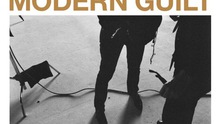‘Peter Broderick’s hip-hop record’. That was the pet name that a good friend of mine lovingly (and apprehensively) assigned the Efterklang collaborator's latest album after watching this teaser video. Whether releasing music as much as a website than as an album (as with his last effort for Bella Union, http://www.itstartshear.com), or crowd-sourcing material via social networking sites such as Flickr (some of the results of which have made it onto this record), Broderick’s often taken to hounding the novelty in his music-making, and These Walls of Mine has always been billed as a collection of assorted ‘experiments,’ rather than a grand, unified artistic gesture. But while he's regularly searched for unconventional and imaginative methods of making pop music, the results have never been devoid of feeling or a humanistic edge. In fact, the majority of These Walls of Mine feels decidedly home-cooked, genuine and humane.
If These Walls of Mine is indeed a home-cooked meal, then ‘I’ve Tried’ is its soul food. Broderick builds the song over a loop of his own layered vocals (perhaps one of the record’s few unifying musical elements – these tracks are fairly stylistically varied), crooning soulful melodies over cocktail lounge bass and washed synths. It’s the record’s most successful moment; presumably the serendipitous result that Broderick hoped his experiments might yield.
Meanwhile, ‘These Walls of Mine’ – the two-part interpretation of the same material that earned this record its aforementioned nickname – sees Broderick step even further out of his comfort zone. “Flowin' may be weird, but it's better than just singin' again/and even though I like to sing/I just think it's fun to try everything”, comes one of the lines, and if it doesn't quite make sense in the spoken word take of ‘Part I,’ these lyrics begin to explain themselves during the rapped (rapped!) ‘Part II’. Despite every fibre of my being imploring me otherwise, I have to tell you that it's great. Any ideas of this track being a frivolous cross-genre exercise are supplanted by Broderick’s earnest attempt to untangle his thoughts and experiences on tape, and it’s often this very human sincerity that leaves the listener putty in his hands. A similar thread follows on ‘I Do This,’ another spoken word piece in which Broderick does his best to iron out the creases of his tangled thoughts (or rather, as the sleeve notes seem to suggest, relay the advice given to him by some internet commenters). All in all, though, he's asking similar questions to those that we all ask ourselves, and it's this universality that begs a connection from the listener.
In many instances, These Walls of Mine is simply a musician following instinct and intrigue, and in that respect Broderick and Erased Tapes have always been very cards-on-the-table about this record. We can’t fault the man for being a 25 year-old who’s fought his way into the enviable position of having the ability, freedom and audience to put what otherwise might have been some late-night audio doodles to wax. And while musically they might be ‘doodles', that doesn’t mean that Broderick doesn’t look upon them as an opportunity to create something worth creating, something that might endure. It's those thematic ideas of self-worth and pride that beget the sort of personal, intimate relationship that we've come to recognise in the music of many of the Erased Tapes family over the last five years, and that's something that will always be worth hearing.
-
7Sam Cleeve's Score






















